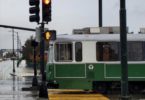By Prithvi G. Tikhe
BU News Service
Patrick Turner could see his breath as he bent and adjusted the wet, slippery track with his crowbar. A train approached the station.
“I’d rather have snow right now than rain because in the rain you get fricking soaking wet,” said Turner, clutching a radio in his hand.
For many Bostonians, the train (known as the T) is a nightmare during winter. But whether it’s during blizzards, strong winds or or a string of below-freezing days, Massachusetts Bay Transportation Authority (MBTA) employees work to keep the T safe and functional.
At the Boston College T station, there is Turner, an MBTA inspector.
Every day, Turner manages about 100 operators. From schedules to logging hours to filing commuters’ complaints, Turner sits in his corner office situated at the stop. Some operators go in and out of his office; others watch news on a small TV hanging on the wall. A few drink sodas and chat. Turner flips through massive binders and shouts directions from an open window.
Born and raised in Boston, Turner, a resident of North Reading, was a carpenter until he entered the lottery for a job with the MBTA in 2008. He was looking for a career job and knew he would receive a good pension after 23 years of service.
Turner joined as an operator and, after six years, became an inspector.
Whether it’s clearing snow from platforms and applying sand and salt, checking for the icing of doors, examining the rail heaters, fixing and inspecting the tracks and overhead wires for ice buildup, Turner does many jobs.
Nothing is more important to Turner than the safety of commuters.
“You have people’s lives in your hands every day,” said Turner, 42, speaking with a heavy Boston accent.
Unlike his fellow employees who work underground, Turner faces obstacles such as low visibility, vehicles, people crossing tracks and dangerous slippery conditions as part of his daily routine.
“The best part of my job is I’m out of the [weather] elements,” said a subway inspector sitting in a customer service booth at Kenmore Square Station. He said he didn’t want to draw the MBTA’s attention, so he asked to remain anonymous.
According to the Occupational Safety and Health Administration, working outside in freezing weather can lower body temperatures and cause the body to experience cold stress. Conditions such as frostbite, hypothermia and trench foot – a painful condition of the feet marked by blackening and death of surface tissue – can occur with extended exposure to cold and wet conditions.
“I’m used to this shit, and it still sucked,” said Turner, as he recalled the winter of 2015 when he did not receive hazard pay, additional pay for work involving physical hardship.
He did not have the necessary equipment, like a Bobcat, to deal with excessive snow and was constantly shoveling and salting platforms to prevent commuters from slipping on ice. Ice blocked the switches, which can cause trains to derail. Since the switches are sensitive to salt, Turner used heaters to melt the ice buildup.
Laughing at the memory and munching on a bag of chips, he walked out as a train rolled into the yard. It was getting dark and the rain had tapered to a stinging drizzle.
Devin, a tall Jamaican in his mid-50’s with a friendly smile, who wished not to reveal his last name for personal reasons, approached the wooden tables outside the rest stop.
“[Turner is] a dedicated employee [during] spring, summer, winter, the whole nine yards,” said Devin, a chief inspector who has known Turner for the past 10 years. “Winter doesn’t really affect his job; I know he’s effective.”
Turner talked on the radio to colleagues about moving a stalled T car that had lost power on the C line which was causing delays on the B, C and D lines. People waited for the train; a few paced up and down the platform with hands in their pockets.
“It is ancient and unreliable,” said Nikita Sampath, a former regular commuter, who said she is pleased to be off the B line. “The T is ‘FUBAR’ – f****d up beyond all repair!”
Sand and salt covered puddles of rain water that froze overnight on the platform.
Sitting in his office and twirling an orange pencil in his hand, Turner acknowledged the T is a public service and is going to have its bad days.
“I take commuters’ complaints with a grain of salt,” he said, shrugging his shoulders. “They complain, but I know they’ll be back next day to take the service.”
The job is not easy but Turner stays positive by focusing on pleasant memories. After a day of hard work, he looks forward to spending time with his 8-year-old daughter and playing ice or deck hockey.
Turner reminisced about the moment he reunited a lost and frightened elderly Chinese woman who did not speak English and was suffering from dementia with her son at the Government Center T station.
The MBTA is a community where commuters and employees become part of each other’s daily routine, added Turner’s girlfriend of three years, Kathleen Rogers, a nurse practitioner in North Shore.
Several days a week, Turner escorts George, a blind regular green line commuter, from Government Center to North Station and buys him food from Dunkin’ Donuts.
“I love when he comes home and tells me all about his buddy, George,” Rogers said.
Although his girlfriend worries about him getting frostbite and fears for his life when he works with brakes under disabled trains, Turner finds his job rewarding.
“I wouldn’t change anything about my job,” said Turner, with a smile, as he walked out into the frigid evening with a yellow crowbar and a green neon jacket.




